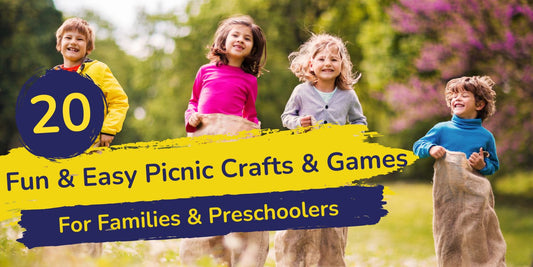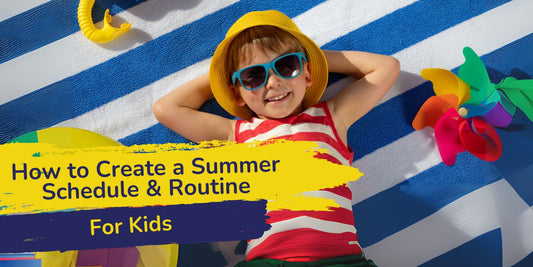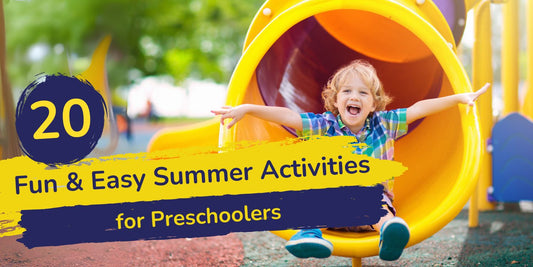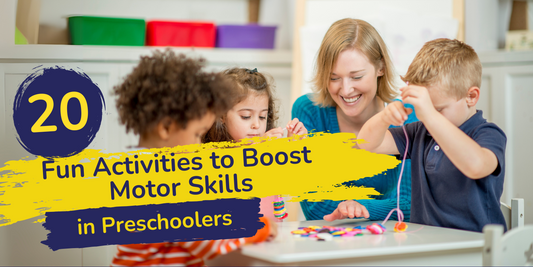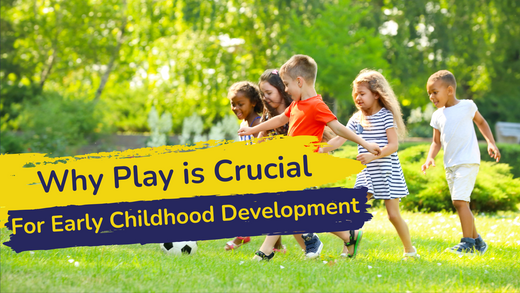
Importance of Play In Enhancing Early Childhood Development
Playing is an important part of early childhood development, providing the basis for cognitive, social, emotional, and physical growth. It is a basic part of growing up, providing more than just fun. It acts as an important tool for education, enabling kids to investigate their surroundings, grasp social standards, and build crucial life abilities. By playing, kids develop skills in talking, working together, and finding solutions, which prepares them for later achievements. Participating in play assists children in developing self-assurance, toughness, and flexibility, which are essential for dealing with the challenges of life.
TYPES OF PLAY AND THEIR ADVANTAGES
Different kinds of play provide different advantages:
1. Free Play: Unstructured and child-led, free play promotes creativity and imagination. It enables kids to investigate their interests and make choices on their own, promoting self-expression and independence.
2. Organized Play: Following rules or goals, organized play assists kids in building discipline, concentration, and collaboration. Games such as board games and sports help children learn how to obey directions and collaborate towards shared objectives.
3. Physical Activity: Running, jumping, and climbing help improve physical health and coordination. Physical activity also assists children in expelling energy and coping with stress, leading to improved overall health.
4. Social Play: Playing with friends helps kids learn how to get along with others and work out problems. Engaging in social activities is important for forming friendships and gaining insight into different viewpoints.
WHY PLAY IS IMPORTANT FOR EARLY CHILDHOOD LEARNING
Play is an essential part of young children's growth, serving as a fun and natural way for them to explore and understand their environment. Play helps preschoolers build important cognitive, social, and emotional abilities. It promotes exploration, trial and error, and finding, enabling kids to understand their surroundings. Play also promotes language growth, as kids participate in discussions and storytelling while they play. Play assists children in developing self-assurance and the ability to bounce back by offering a secure environment for experimenting and making mistakes.
1. COGNITIVE ADVANTAGES OF PLAY IN YOUNG CHILDREN
Play is an essential aspect of early childhood growth, and its effect on cognitive development is significant. Playing not only brings enjoyment to children but also improves important thinking abilities that form the basis for learning throughout life.
- Memory Improvement : During play, kids interact with different experiences that need them to recall rules, procedures, or tactics. Engaging in activities like putting together a puzzle or playing a pretend game helps improve children's memory. Repeatedly playing, especially, reinforces fresh understanding, making it simpler for young brains to remember information in the long run.
- Enhanced Focus and Attention : Play helps kids focus for longer periods, improving their concentration and attention span. For example, constructing a tower with blocks or working on a intricate craft demands continuous focus. These tasks promote the development of patience and the skill to focus on tasks, which are important for academic learning as children get older.
- Problem-Solving Skills : Unstructured play, like play without specific rules or using imagination for pretend play, often includes problems that help develop problem-solving skills. Children are learning critical thinking skills by figuring out how to balance a structure, solve puzzles, and navigate social scenarios during pretend play. They are learning to assess options and make decisions. This innovative problem-solving fosters adaptable thinking, enabling individuals to tackle upcoming obstacles with assurance.
2. DEVELOPING SOCIAL SKILLS THROUGH PLAY

Building Communication Abilities:
Play is crucial for enhancing children's ability to communicate. Through playing together, children learn to communicate their ideas, listen to others, and understand non-verbal signals. Engaging in activities such as acting out roles and playing games with others helps kids express their thoughts and discuss with friends, improving their spoken and body language skills. These experiences assist kids in becoming proficient communicators, a skill that is crucial for forming connections and thriving in social settings.
- Encouraging Teamwork and Collaboration : Play also promotes teamwork and collaboration among children. Team activities, like team sports or group building projects, need children to cooperate towards a shared objective. These events educate kids about the significance of sharing, rotating, and valuing others' ideas. Participating in playing together helps kids understand how to interact with others and develop the ability to understand and share the feelings of others. These abilities are essential for building good connections and operating efficiently in group situations. To find more suggestions on how playing promotes teamwork, take a look at this article.
- Language Development : Growing Vocabulary Play is an essential factor in increasing a child's vocabulary. Children are introduced to new words and phrases in context through activities such as storytelling, role-playing, and interactive games. For instance, when pretending to be at home, kids may use words linked to preparing food, tidying up, or roles within the family. This experiential learning benefits them by assisting in comprehending and retaining new words more efficiently. Motivating kids to participate in various types of play can greatly improve their language abilities, setting a strong base for reading and communication.
- Enhancing Listening Abilities : Playing also enhances listening skills, which are essential for successful communication. Activities like "Simon Says" or scavenger hunts require children to focus and understand spoken directions. These tasks assist kids in enhancing their skill to actively listen and react correctly. Moreover, playing in groups motivates kids to pay attention to their peers, promoting compassion and comprehension. By including games that focus on listening during playtime, parents and teachers can help children improve their language skills and socialize better.
3. THE SIGNIFICANCE OF PLAYING OUTSIDE IN YOUNG CHILDREN'S EARLY YEARS

Advocating for Physical Activity
Playing outside is important for promoting exercise in small kids. It gives them the room and liberty to run, leap, scale, and investigate, encouraging physical health and motor skill growth. Engaging in games such as tag, biking, or using playground equipment can assist kids in developing their muscle strength, coordination, and stamina. Regular exercise is important for keeping a good weight, enhancing heart health, and lowering the chance of long-term illnesses. By including outdoor activities in everyday schedules, parents and teachers can promote children's physical health and teach them long-lasting healthy practices.
Engaging with the natural world
Playing outside also gives kids the chance to interact with the natural world. Being in nature helps kids to discover their surroundings, encouraging a sense of curiosity and amazement. Engaging in activities such as walking in nature, gardening, or playing in the sand promotes children to watch and engage with plants, animals, and natural materials. This bond with the natural world can improve children's comprehension of the environment and encourage a feeling of duty for its protection. Furthermore, being in natural environments has been proven to decrease stress and enhance mental health, which is why outdoor play is a crucial part of a well-rounded childhood.
Here are some enjoyable and interactive outdoor activities for 4-year-olds that encourage physical activity while stimulating their creativity:
1. Nature Hunt: Make a list of basic items from nature, such as a leaf, feather, or smooth rock, and allow kids to search for them in their environment. This task promotes bodily motion, awareness abilities, and creative thinking as they pretend to be explorers on a quest.
2. Obstacle Course Adventure: Create a backyard obstacle course with cones to navigate around, logs to walk on, and hoops to leap through. Children can imagine themselves as astronauts exploring a faraway planet or as superheroes conquering challenges to rescue others. This involves their bodies in running, leaping, and balancing, while their imaginations generate thrilling narratives.
3. Drawing with Chalk and Playing Games :Give children sidewalk chalk to create their own make-believe worlds on the sidewalk, such as castles and rocket ships. Include interactive activities such as hopscotch or design labyrinths for them to navigate. This promotes imagination while also promoting teamwork and bodily movement.
4. Play Pirate Treasure Hunt: Hide "treasures" such as toys or shiny objects in the yard and provide children with an easy map or clues to help them find the treasures. They can play as pirates looking for buried treasure, using their imagination to search for the hidden items while moving around.
5. Parachute Game: Kids can form a circle and use a big parachute or a large sheet. They can shake it, bounce balls on it, or hide under it like a tent. Parachute activities encourage teamwork and physical activity as children pretend to be in a spaceship or underwater.
4. FUN AND INNOVATIVE PLAY SUGGESTIONS FOR YOUNG CHILDREN

Playing indoors provides countless chances for imagination and education. Basic tasks such as constructing with blocks or making art with crayons and paper can encourage a child's creativity. Consider creating a small theater for puppet performances or storytelling sessions to improve language abilities. Sensory containers filled with rice, beans, or sand can offer the chance to explore through touch and improve small muscle skills. For a more organized method, think about using educational toys or games that concentrate on numbers, letters, or shapes. These activities not just amuse but also encourage mental development and imagination.
Exploring the Outdoors Outdoor play is crucial for physical well-being and social growth. Games such as tag, hide and seek, and hopscotch promote physical activity and coordination. Taking a stroll in nature or looking for hidden treasures can make kids curious and help them learn about the world around them. Creating a basic obstacle course using cones, ropes, and hula hoops can test their ability to solve problems and increase their self-assurance. Gardening is an awesome outdoor hobby that helps to learn about responsibility and patience.
Here are some suggestions for crafts, creative games, and sensory activities that can be easily done at home or school to boost creativity and critical thinking.
Projects for Precise Hand Movements and Imagination :
Engaging in crafting can improve fine motor skills and give kids a chance to be creative.
1. Paper Plate Animals: You will need paper plates, googly eyes, colored paper, and glue. Allow kids to use scissors to make animal shapes for ears, noses, and tails. This improves small muscle skills by using scissors and glue, and also encourages imagination as they create their own animals.
2. Bead Stringing: Children can use big beads and strings to make necklaces or designs. This task improves the ability to coordinate hand movements with what the eyes see and the skill in using the hands, while also promoting originality in choosing colors and designing.
3. Create your own puffy paint art: by combining equal amounts of shaving cream and glue, then mixing in some food coloring. Allow children to use this mixture to paint and create artwork. The feel encourages sensory exploration, while the activity of painting nurtures creativity and small muscle coordination.
Creative Activities for Developing Social and Cognitive Skills
Creative play promotes the growth of interpersonal abilities, critical thinking skills, and mental development.
- Imaginary Play Areas: Create themed play spaces such as a market, a medical clinic, or a spacecraft. Kids can assume responsibilities, solve problems, and communicate with others, which enhances social awareness, communication abilities, and imagination. For instance, they can act as astronauts solving issues on a faraway planet.
- Playing with Blocks: Inspire kids to construct cities, castles, or spaceships using blocks. They can invent tales about the buildings they make. This encourages an understanding of space, important thinking, and creative storytelling.
- Dress-up and Pretend Play: Give kids costumes or regular things to pretend to be various characters such as firefighters, cooks, or adventurers. This kind of creative play develops understanding, storytelling skill, and imagination.
Using the Senses to Explore and Develop Thinking Skills
Sensory activities involve children's senses, which help to stimulate their thinking skills and imagination.
- Sensory Bins: Put rice, beans, or sand in a container and include small toys, cups, and spoons. Kids can discover different textures, practice pouring, and participate in make-believe games by imagining scenarios like a dinosaur excavation or a treasure hunt. Sensory containers aid in developing small muscle control and promote curious thinking.
- Water Play: Allow children to use water, cups, and small toys. Water play promotes exploration of pouring, floating, and sinking. This type of unrestricted sensory activity encourages critical thinking and scientific reasoning.
-
Using playdough, let kids make shapes, letters, or pretend animals. Playdough assists in building hand strength and improving fine motor skills, while also providing the opportunity for creative expression and imaginative play.
Riddles and Brain Teasers for Analytical Thinking
Puzzles and games that require problem-solving can test the brain and improve the ability to think critically.
- Jigsaw Puzzles: Select puzzles suitable for the child's age that encourage critical thinking, pattern recognition, and spatial awareness development. Solving a puzzle helps to build persistence and rational thinking.
- Shape Sorting Activities: Offer shape sorting toys where kids can match shapes to the correct openings. This exercise improves the ability to solve problems and the coordination of small movements.
- Story Sequencing Cards: Provide kids with cards containing images that narrate a basic story in a step-by-step order. This task assists in building skills in storytelling, critical thinking, and comprehending consequences.
5. The Lasting Effect of Play on Young Children's Growth

The advantages of play go far beyond just having fun. Participating in games during the beginning of a child's life sets the groundwork for learning and achievement throughout their life. It improves skills in solving problems, being creative, and thinking critically, which are important for doing well in school and succeeding in future jobs. Playing also fosters social abilities, including teamwork, communication, and understanding, which are important for forming strong connections.
Additionally, playing promotes physical well-being by promoting movement and coordination. Play also has a major impact on developing resilience in children. During play, kids come across obstacles and difficulties, like losing a game or having trouble with a tough puzzle. These experiences help them deal with disappointment, adjust to new situations, and keep going when things are tough. Children build up the ability to handle real-life challenges by learning to overcome obstacles in a safe and supportive environment. Promoting activities that require problem-solving and taking risks can assist kids in developing confidence and a mindset focused on growth, which are vital qualities for long-term success.
Incorporating both organized and casual play into everyday life is important for promoting balanced growth. Structured play, such as scheduled sports or lessons, offers structure and goal establishment. Unorganized play, however, gives kids the freedom to explore and use their creativity. Finding a middle ground between the two things makes sure that kids get advantages from both structured learning and imaginative discovery. Parents can create a fixed schedule for organized activities while also letting their kids play freely at any time during the day. Establishing a Space Suitable for Play A play-friendly setting promotes kids to participate in different types of play. Here are a few suggestions:
- Allocate Play Areas: Reserve certain areas for play, both inside and outside, where children can safely explore.
- Offer a range of materials: Provide a mix of toys, art supplies, and games to encourage different kinds of play.
- Restrict time spent on screens: Promote physical and creative play by establishing limits on screen usage.
- Promote Outdoor Play: Provide chances for playing outside, which allow for breathing fresh air and discovering nature.
6. How Playing Promotes Innovation and Critical Thinking Nurturing Creativity Through Fun

Engaging in play sparks creativity. When kids play make-believe, they come up with their own make-believe worlds and stories, trying out different roles and viewpoints. This kind of play enables them to try out ideas and concepts, developing mental flexibility and imaginative thinking. Offering toys such as blocks, dolls, or costumes can promote imaginative play. Parents and teachers can additionally encourage creativity by posing open-ended inquiries and letting kids take charge of the play. This method fosters a child's capacity to think creatively and generate unique concepts.
Utilizing Play for Finding Solutions
Promoting teamwork and cooperation
Playing also fosters teamwork and cooperation, necessary abilities for solving problems. Working as a team to complete tasks such as constructing a fort, participating in team sports, or playing cooperative games helps children learn the importance of cooperation and working together to achieve a shared objective. These experiences aid in the development of communication, bargaining, and understanding, as children learn to listen to others and take into account various viewpoints. Motivating kids to join in group activities and offering chances for working together to solve problems can improve their ability to interact with others and work well in a team. To learn more about the significance of play in building social abilities, read this article.
7. Play and Building Self-Confidence

Play has an important role in boosting self-esteem in young kids by promoting bravery, self-communication, and a feeling of achievement. By engaging in fun activities, kids learn how to confront difficulties, communicate their thoughts openly, and achieve goals, all of which help to boost their self-assurance in their skills.
Risk-Taking and Self-Expression
Play gives children a secure space to investigate their limits, experiment with new activities, and take chances. These experiences are crucial for building self-assurance. Encouraging Taking Risks: While playing, kids naturally try out various ideas, physical movements, and tactics. For instance, they might go up a bit higher on the play structure or attempt to balance on just one foot. In a supervised setting, taking these minor risks can help kids build up their ability to bounce back from challenges and keep trying. When they try out new things and do well, their self-assurance increases.
Encouraging Self-Expression:
Engaging in imaginative and creative activities gives children the opportunity to share their feelings, thoughts, and ideas without worrying about criticism. Whether it's through acting, telling stories, or making things, kids build self-assurance by being true to themselves. The ability to make and share their own stories helps to develop a confident self-perception and a belief in their artistic skills.
Activities to Build Confidence through Success
Some games and activities emphasize finishing and getting better at something, which makes kids feel proud and helps them feel good about themselves.
- Puzzles: Finishing a jigsaw puzzle or figuring out shape-matching games can be very satisfying. Puzzles need critical thinking and determination, and when kids finally fit that final piece, they feel a real sense of achievement. Every completed puzzle strengthens their confidence in their ability to tackle problems, boosting their belief in their mental capabilities.
- Obstacle Courses: Basic obstacle courses test kids to use their physical and mental abilities to get through. Successfully finishing a challenging course, whether at home or in a playground, helps children feel proud and improves their physical self-assurance. Conquering every obstacle in the race boosts their confidence in their power and flexibility.
- Playing with Blocks or LEGOs: Making towers or other buildings with blocks needs concentration, imagination, and problem-solving skills. When kids see what they have built, they feel proud. This activity that focuses on success helps to nurture not just creativity but also self-assurance in their capability to make ideas a reality.
8. Play as a Way to Bring Parents and Children Closer Together

Enhancing the bond between parents and children Engaging in activities together is a strong method to enhance the connection between parents and kids. By participating in games, parents can join their child's world, building trust and empathy. This common experience enables parents to bond more deeply, establishing a secure environment for children to communicate freely. Through engaging in activities, parents can also demonstrate favorable actions and communication abilities, strengthening familial principles and establishing a close emotional bond.
Activities That Encourage Relationships
To strengthen the bond between parents and children, they can engage in activities that promote communication and teamwork. Here are a few suggestions:
1. Board Games: Select games that need teamwork and strategy, enabling discussion and collaboration.
2. Outdoor Activities: Things like walking or throwing a ball help with physical fitness and allow for good talks.
3. Creative Projects: Participate in art and craft activities or construction projects that encourage creativity and critical thinking.
4. Storytelling: Make up stories as a group, each person adding to the tale one at a time. This promotes creativity and attentive listening.
9. The Impact of Play on Imagination and Creativity

Play is an important part of growing up, acting as a doorway to imagination and creativity. Children use different types of play to discover their surroundings, improve their ability to solve problems, and build connections with others. This article explores the importance of play, emphasizing its advantages and providing practical ways to include it in everyday life for improved development and connection.
Ways Play Encourages Creativity:
Play is a strong trigger for creativity, enabling kids to discover new environments and concepts. When kids participate in pretend play, they make up situations, people, and narratives, which allows them to investigate fresh concepts and viewpoints. This kind of play promotes children to think creatively and develop their distinct creative skills. Engaging in activities such as sketching, pretending, and sharing stories allow kids to show their feelings and spark their creativity. This creative game assists them in comprehending various viewpoints and cultivating empathy. Children develop their ability to visualize and think creatively by participating in activities such as building with blocks or drawing. This lays the groundwork for creative thinking.
10. The Link Between Playing and Physical Wellbeing

Physical activity is important for the physical growth of kids. It assists in enhancing physical skills, synchronization, and stability. Engaging in activities such as running, leaping, and scaling help to build muscle and bone strength, which promotes overall physical health. Regular physical activity also promotes heart health and aids in controlling weight. Participating in active play helps children to have fun while moving, which sets the foundation for a lifetime of physical activity.
Abilities for Succeeding in a Formal School Environment
Many abilities acquired through play are essential for succeeding in a formal school environment:
- Attention and Concentration: Children develop the ability to focus on particular tasks through both organized and unstructured play. This skill is important for school activities such as following directions and completing assignments.
- Problem-Solving: Play aids in the growth of critical thinking and problem-solving abilities as kids learn how to overcome obstacles, like finishing a game or constructing something imaginative. This mental adaptability is important for subjects such as mathematics and science.
- Social Skills: Playing, particularly in groups, promotes collaboration, interaction, and collaboration, abilities that are essential for working with classmates in school.
- Emotional Regulation: Play helps kids feel and control various emotions, teaching them to be patient and determined—important qualities for dealing with the organized setting of school.
- Fine Motor Skills: Engaging in activities such as sketching, slicing, or handling tiny items enhances coordination, which is crucial for penmanship, using scissors, and other school activities.
Conclusion
Play is important for young children's growth, assisting them in developing concentration, critical thinking abilities, and self-assurance. By engaging in enjoyable activities, children enhance important skills necessary for doing well in school, such as focus, socializing, and managing emotions. In the end, playing builds a solid base for continuous learning and development.



